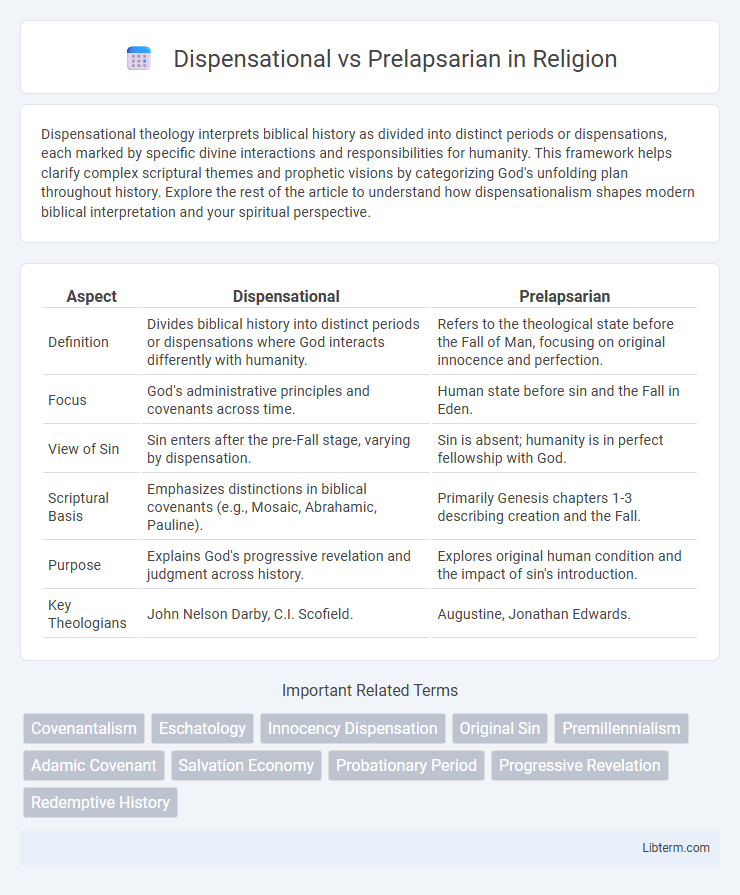Dispensational theology interprets biblical history as divided into distinct periods or dispensations, each marked by specific divine interactions and responsibilities for humanity. This framework helps clarify complex scriptural themes and prophetic visions by categorizing God's unfolding plan throughout history. Explore the rest of the article to understand how dispensationalism shapes modern biblical interpretation and your spiritual perspective.
Table of Comparison
| Aspect | Dispensational | Prelapsarian |
|---|---|---|
| Definition | Divides biblical history into distinct periods or dispensations where God interacts differently with humanity. | Refers to the theological state before the Fall of Man, focusing on original innocence and perfection. |
| Focus | God's administrative principles and covenants across time. | Human state before sin and the Fall in Eden. |
| View of Sin | Sin enters after the pre-Fall stage, varying by dispensation. | Sin is absent; humanity is in perfect fellowship with God. |
| Scriptural Basis | Emphasizes distinctions in biblical covenants (e.g., Mosaic, Abrahamic, Pauline). | Primarily Genesis chapters 1-3 describing creation and the Fall. |
| Purpose | Explains God's progressive revelation and judgment across history. | Explores original human condition and the impact of sin's introduction. |
| Key Theologians | John Nelson Darby, C.I. Scofield. | Augustine, Jonathan Edwards. |
Introduction to Dispensationalism and Prelapsarianism
Dispensationalism is a theological framework dividing biblical history into distinct periods or dispensations, where God interacts with humanity in different ways, emphasizing literal interpretations of scripture and future prophetic fulfillment. Prelapsarianism refers to the state of humanity before the Fall of Adam and Eve, highlighting innocence, original righteousness, and unbroken fellowship with God in the Garden of Eden. These concepts shape differing understandings of divine-human relationships and moral conditions throughout biblical history.
Historical Origins of Dispensationalism
The historical origins of Dispensationalism trace back to the early 19th century, primarily through the teachings of John Nelson Darby, a prominent figure in the Plymouth Brethren movement. Dispensationalism divides biblical history into distinct periods or dispensations, each representing a different way in which God interacts with humanity, contrasting with the Prelapsarian view that focuses on the state before the Fall of man. This theological system gained widespread popularity in the United States through the publication of the Scofield Reference Bible in 1909, which emphasized literal interpretation and a futurist eschatology.
Historical Roots of Prelapsarianism
Prelapsarianism traces its historical roots to early Christian and patristic thought, notably in the works of Augustine, who emphasized the state of humanity before the Fall in Eden. This theological concept contrasts sharply with dispensational frameworks by centering on the original innocence and moral perfection of mankind prior to sin. Understanding Prelapsarian thought requires examining its evolution through medieval scholasticism, where debates on free will and divine justice further shaped interpretations of humanity's pre-fall condition.
Core Doctrines of Dispensationalism
Dispensationalism centers on distinct dispensations in God's redemptive plan, emphasizing a literal interpretation of Scripture and a clear division between Israel and the Church. Core doctrines include the premillennial return of Christ, a future rapture of the Church, and the belief in ongoing prophetic fulfillment tied to Israel. This theological framework contrasts with prelapsarian views by highlighting progressive revelation and specific covenantal periods prior to the fall.
Key Beliefs of Prelapsarian Thought
Prelapsarian thought centers on the state of humanity before the Fall, emphasizing original innocence, perfect communion with God, and unblemished moral purity. It asserts that Adam and Eve existed in harmony with creation, free from sin and death, reflecting an ideal divine order. This perspective contrasts Fallen realities by highlighting a perfect pre-fall existence as the foundational theological framework for understanding human nature and divine expectations.
Biblical Interpretations: Dispensational vs Prelapsarian
Dispensational theology divides biblical history into distinct periods or dispensations, emphasizing God's varied administrative approaches to humanity, while the Prelapsarian view centers on the state of innocence before the Fall of Adam and Eve in Genesis. Dispensational interpreters often highlight prophetic fulfillment and eschatological timelines, contrasting with Prelapsarian perspectives that focus on humanity's original holiness and consequent loss of innocence as foundational to sin's entrance. These theological frameworks influence the understanding of covenant theology, the nature of sin, and God's redemptive plan within scripture.
Major Theological Differences
Dispensational theology emphasizes distinct historical periods where God interacts with humanity under different covenants, highlighting a future rapture and a literal thousand-year reign of Christ on earth. Prelapsarian thought centers on the state of humanity before the Fall, stressing the original innocence and perfect fellowship with God prior to sin entering the world. The major theological difference lies in dispensationalism's structured timeline of divine administration versus prelapsarianism's focus on humanity's pre-sin nature and conditions.
Influence on Modern Christian Thought
Dispensational theology, emphasizing distinct biblical economies and future prophetic fulfillment, shapes contemporary evangelical eschatology and premillennialism, profoundly influencing modern Christian interpretations of scripture. Prelapsarian perspectives, focusing on the original state of humanity before the Fall, inform theological discussions on original righteousness and human nature in Reformed traditions. Both frameworks contribute to diverse doctrinal views on grace, salvation history, and human responsibility within modern Christian thought.
Debates and Controversies
Debates surrounding Dispensational versus Prelapsarian views primarily center on interpretations of biblical history and theological implications regarding human nature and salvation. Dispensationalists emphasize distinct epochs in God's plan, while Prelapsarian perspectives focus on the state of humanity before the Fall, leading to controversies over predestination, free will, and original sin. Key controversies involve scriptural exegesis of Genesis and Pauline epistles, influencing denominational doctrines and eschatological expectations.
Conclusion: Comparative Insights
Dispensational theology emphasizes distinct historical economies in God's plan, highlighting progressive revelation and specific covenant administrations. Prelapsarian perspectives center on the state of humanity before the Fall, underscoring original righteousness and the perfect harmony of creation. Comparing both reveals that Dispensational views map God's redemptive timeline, while Prelapsarian insights deepen understanding of human origins and divine intent prior to sin.
Dispensational Infographic

 libterm.com
libterm.com